
This interview is part of our interview series, where we curate stories of regular people that decided to design a life they love. (click here to learn more).
Eric from NomadOnFire.com
Some links to the products mentioned below are affiliate links, meaning that if you click and make a purchase, Nomad Numbers may receive a commission at no additional cost to you. For more information please review our disclaimer page.
I met Eric through our blog as he initially reached out to me by answering one of the emails he received from us after subscribing to our newsletter. As we started chatting I ended up learning about his recent transition to the Digital Nomad lifestyle and the RemoteYear program him and his girlfriend used as a way to smoothly transition into the nomadic lifestyle and also easily connect with like-minded people (which has been one of our challenges during our first year of nomadic travel).
That was enough to pique my interest that I’ve asked if he wanted to be featured on our blog as part of our interview series and the rest is history.
Eric is a 30 years old American, originally from Michigan, but he lived the last three years in Austin, TX, and the four years before that in Louisville, Kentucky. Currently, he is in Chiang Mai, Thailand. Without further ado, let’s hear directly from Eric.

Lifestyle change
What does a typical day in your life look like for you today? And how does it differ from your lifestyle before?
Eric: Adventure and flexibility are the first two words that come to mind!
Typically I wake up without an alarm clock, head to a cafe or coworking space to work for a few hours, then in the afternoon, I like to go to the gym- some circuit training or Crossfit style workout class. After the gym, I’ll grab some lunch with friends, then explore the city for a bit. In the evening I may relax- read a book or watch a movie or do something a bit more social, grab dinner with friends or my girlfriend.
Before, my life was very routine and structured. I worked as an Operations Manager on a shift schedule with very rigid work hours and long days. I would wake up at 5:30 am commute 45 minutes to work and not be home until 6:30 or 7 pm at night.
My life is entirely different now and so much better, being able to meet new people and experience new places, food and culture are fantastic, and my favorite thing about the Digital Nomad Lifestyle!
Would you mind digging more into the key differences between your life as an Operations Manager and your life as a Digital Nomad? What would you say is the key factor driving the choice you are making daily? How has this change from before?
Check out the infographic below to contrast how Eric’s priorities shifted between working and traveling.

What led you to decide to change your lifestyle?
Eric: Burnout and feeling stuck in my current life trajectory. Working as an Operations Manager was a lucrative field to be in, but came with stress and a poor work/life balance. I worked nights, weekends, long hours, holidays. I felt that I was sacrificing some of the best years of my life on work that I wasn’t passionate about. Thankfully I had found the FIRE movement in late 2015 and began to make many positive changes in regards to my finances. In July of this year, I felt confident with my level of savings to quit my job and begin traveling.
What part in the FIRE movement get you excited to pursue it?
Eric: I always had a good system for saving and investing ever since I began full-time employment but never had a strong enough “why” to really ramp up my savings. Once I began reading popular FIRE blogs such as Millennial Revolution I started to view money differently, not as a vehicle to buy material goods but as a way to buy my freedom. I would often daydream of traveling the world or having more time to pursue my hobbies or passions. Now with a crystal clear vision, I had a strong enough “why” to ramp up my savings rate and begin pursuing FIRE.
What were some of the biggest challenges to adjust to this new lifestyle?
Eric: It is a weird feeling to shift from seeing your savings and investments grow every month to see them decrease Learning a new language (Spanish) and different cultures is challenging but in a good way. Maintaining a healthy routine while traveling has also been more of a challenge than I thought it would be. As a digital nomad, this is my life, not a long vacation. Developing a consistent work, exercise, and healthy eating routine while traveling to a new country every month took some practice to refine.
What life philosophy has been guiding you through this journey?
Eric: Regret Minimization Framework. I had this burning desire to travel, see the world, experience other cultures, and meet awesome people along the way. You only live once. I knew that if I didn’t do this now, I would regret it for the rest of my life. Thinking about things this way really assuaged my fears of giving up a high paying secure job to move halfway across the world.
As you embrace a nomadic lifestyle, were there any challenges with spending more time with your partner? Was there any adjustment you made to your schedule to keep a healthy balance?
Eric: The first time my girlfriend and I lived together was when we started the digital nomad lifestyle living in a 1 bedroom apartment in Santiago, Chile. But, so far so good! We specifically chose a work and travel program to begin our nomadic journey so we would have a built-in network of people and friends to hang out with so that it wasn’t just us together 24/7. This way we had other friends to do activities with. In terms of routine, we often do many things together- sightseeing, grocery shopping, fitness, and working. But, we made a conscious effort to take some time apart such as me getting up early and heading to the workspace while she would work from home. And, to avoid distraction we would often go to the same coffee shop or coworking space but would sit in different parts of the room to avoid distractions.
What did your friends and family think of your plan to take on early retirement? What did they think when you announced to them that you will be quitting your day to day job and starting to travel?
Eric: At first, my family was concerned. Up to this point, I had always lived a pretty traditional lifestyle- gotten good grades in school, went to college then got a secure job. No one in my family had traveled extensively internationally or made a drastic career change before. However, once my parents saw that I needed to make this change and that I was beginning my travels with a group, they became very supportive. My friends were all very supportive and excited for me.
Travel
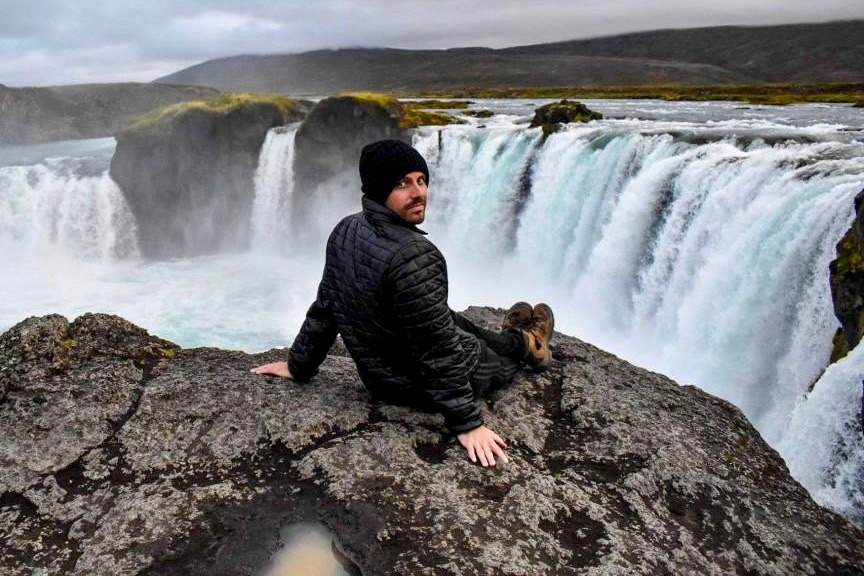
How would you describe your travel style?
Eric: I subscribe to the digital nomad lifestyle and slow travel philosophies.
I’ve learned that I do not like to be always on the move and living out of a suitcase. I like to have a home base apartment in the city that I’m living in. That way, I get a great feel for what it’s actually like to live in the city, not just passing through as a tourist. It also makes it very convenient to take side trips within a few hour drive or flight from the city I’m in.
Santiago, Chile, for example, was my home base for August 2019 and I was able to explore the city as well as take side trips to Valparaiso on the coast, wine tasting in the Casablanca region, and snowboarding in the Andes!
Being with Remote Year has gotten me used to the one month in each city pace, but I think ideally, I would like to spend a bit longer in each place to develop a better routine and get to know the city on a deeper level. I think 2-3 months in a location would be perfect!
I briefly heard about the Remote Year program and I’m wondering if you can expand about it for our readers? For instance, would you mind sharing how it works, why you decided to sign-up, what are some of the benefits you’ve been getting from it as well as any advice you would have for someone that want to get started or need convincing into signing-up?
Eric: Remote Year (RY) is a work and travel program.
You pay them a set monthly fee and they provide you with accommodations in a city, a co-working space membership, travel between the cities and then probably the most important benefit but the most difficult to quantify- a community of amazing fellow travelers. Remote Year currently offers 12, 6, 4 and now 1-month programs throughout the world.
One of my good friends joined a year-long Remote Year program back in 2017. He was absolutely having the time of his life, traveling, seeing new places, trying delicious food and spending time with amazing people! Juxtapose this with my situation at the time, I was working nights, burnt out and generally unhappy with my life trajectory and I really began questioning my path and how I wanted my life to look.
My girlfriend and I made the decision to begin our digital nomad journey by joining Remote Year. This decision was threefold- the first reason was because they take care of all the logistics for you. This was the start of our digital nomad lifestyle and our first time living together, we felt more comfortable having flights, apartments and co-working spaces taken care of upfront so we could focus on work and enjoying the experience as much as possible.
Second, we had heard many concerns about loneliness while living the nomadic lifestyle and wanted a strong community. Our group had 28 amazing people in it and we made many lifelong friends in just four months. Having the community was so important to us, people were extremely supportive of me leaving my job to begin blogging and podcasting. Whether it was business advice or just someone to hang out with and grab coffee it was so refreshing to have a group of people to travel with throughout four different countries in Latin America.
Similar to the community of fellow digital nomads that you are traveling with, Remote Year has a wider network of people and one of the most active and helpful Slack communities I’ve ever been apart of. They also have an extensive alumni or “citizen” offering. Even as my girlfriend and I continue to live nomadically by ourself we will always have access to Remote Year resources and offerings. While we are in Chiang Mai for Jan/Feb of this year we signed up for a Remote Year citizen offering of Work+Connect which for a low fee gives us coworking space access and the ability to jump in with a current Remote Year group for fun activities in the city.
I want to be upfront, at the current time Remote Year has a deposit fee upfront and then costs $2,000 per month for an individual or $1,600 each for a couple sharing a room. This is a high cost and may give many ‘sticker shock”, especially if one of your main reasons for living nomadically is the cost-saving opportunities. However, I found incredible value in being a part of Remote Year and would highly recommend it to anyone interested in trying out or beginning their digital nomad journey. I believe the Citizen benefits alone are worth the cost of the program. Knowing that I have lifetime access to Slack and can easily connect with a fellow digital nomad anywhere in the world is very refreshing and ensures I have a strong community while living the digital nomad lifestyle.
If this is something you’re interested in, please reach out to me with any and all questions!
If you could never travel again and could pick any city to be confined to, where would you pick? And why?
Eric: I absolutely love Medellin, Colombia. Before I went, I heard a lot of hype about it as a digital nomad and expat hotspot, so I tried to temper my expectations, but it completely blew them away. I love Medellin because of the beautiful, friendly people there, it’s very green and has perfect weather year-round, it’s cheap, has plenty of healthy food options and great coffee! I’m curious to see if my answer will change as I continue to travel.
How much stuff do you travel with?
Eric: I have been traveling with a backpack, and one checked duffel bag. However, there were so many things I brought to Latin America that I used so infrequently or never at all. In the first part of 2020, I will be in SE Asia and am hoping to be carry-on only!
What’s something you pack that’s not absolutely essential but you like having it?
Eric: The Original SPIbelt! It’s perfect for holding your phone and keys while going for a run or if you don’t have pockets.
Spending
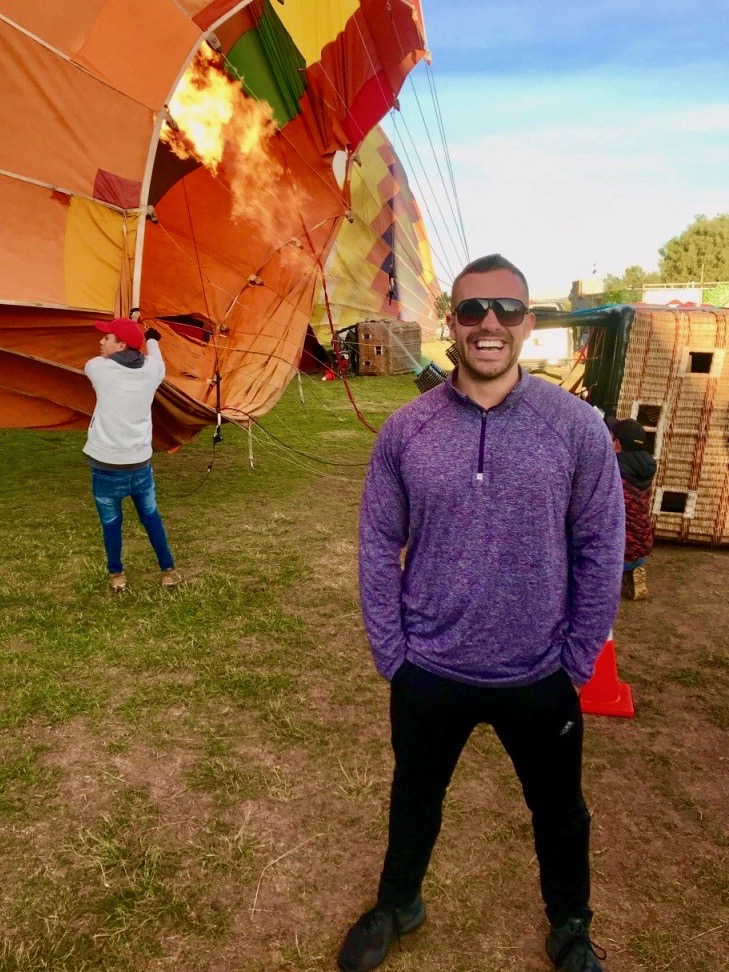
How much money do you spend on travel per year? How many days of travel does this represent? How much does this represent per day and per person?
Eric: This year, I spent just over $16,000, usually averaging $3,500-$4,000 total per month overall. $1,600 of this is the Remote Year fee (discounted as a couple).
For my upcoming travels in 2020, I will be traveling with just my girlfriend in SE Asia. I anticipate significant cost savings and hope to be in the $1,500-$2,000 per month total range. $50-$66 per day instead of $116-$133.
Here is the breakdown of our total monthly spending:
| Spending Category | Monthly amount (in USD) |
|---|---|
| Accommodation | $1600 |
| Living expenses (taxes, cell phone, netflix…) | $105 |
| Groceries | $420 |
| Dining out / Take-out | $680 |
| Activities | $257 |
| Health Care / Health Insurance | $284 |
| Local Transportation | $75 |
| Global Transportation (from one region to another) | $250 |
| Other expenses (gifts, …) | $63 |
| Monthly Total | $3,734 |
| Yearly Total | $44,808 |
| For One Person / Per Day Total | $122 |
Note: This budget is higher than what Eric plans on spending in 2020 as his Remote Year is over and he will be traveling to Southeast Asia where we know that the cost of living is pretty low. Eric expects his current cost of living to be cut at least in half (if not more!).
How do you fund your travel (savings/work whilst traveling/other)?
Eric: Thankfully, I started implementing FIRE principles in 2015. I had a 60+% savings rate – maxing out my 401K, HSA, and contributing to an online savings account as well as taxable investments. In July of 2019, I felt comfortable that I had a year-long cash buffer to fund my travels. In 2020 I plan to pick up some part-time work doing freelance writing.
I’m assuming you are working towards being financially free. What is your strategy to reach FI and how long will it take you to get there? Would geo-arbitrage be part of your strategy now that you are nomadic? Why did you decide to reach financial freedom? What were some of the challenges you had to face along the way?
Eric: When I began pursuing FIRE I was interested in full FIRE and Fat FIRE, having savings/investments between x25-30+ my annual expenditures and dreamed of never working again.
However, as I continued reading and educating myself about FIRE it seemed that almost everyone continued working or had some sort of creative output once they achieved FIRE so my priorities began to change. When I quit my full-time job I had achieved lean-FIRE but not full FIRE because I knew I needed a drastic change and wanted to start enjoying my life more in the present moment. Giving up a high income was obviously a major setback in terms of achieving full Financial Independence but I don’t regret my decision for a second. My strategy has changed from earning/saving a high amount but generally being unhappy to a more laid back strategy where I work part-time but am able to enjoy my life in the present even if that takes me much longer to achieve FI.
Geoarbitrage is absolutely part of my strategy and similar to your strategy I believe that after a few years of this lifestyle my girlfriend and I will have more of a home base but continue to travel and live nomadically throughout the year. One of the amazing things I learned by pursuing FIRE and then transitioning to the digital nomad lifestyle is that it is not binary, it is a sliding scale of freedom. It’s not that you’re either FIRE or not, or a digital nomad or not, you can customize this lifestyle to fit your needs and shifting priorities over time! Every dollar you save brings you more and more freedom and less reliance on a full-time job.
Community
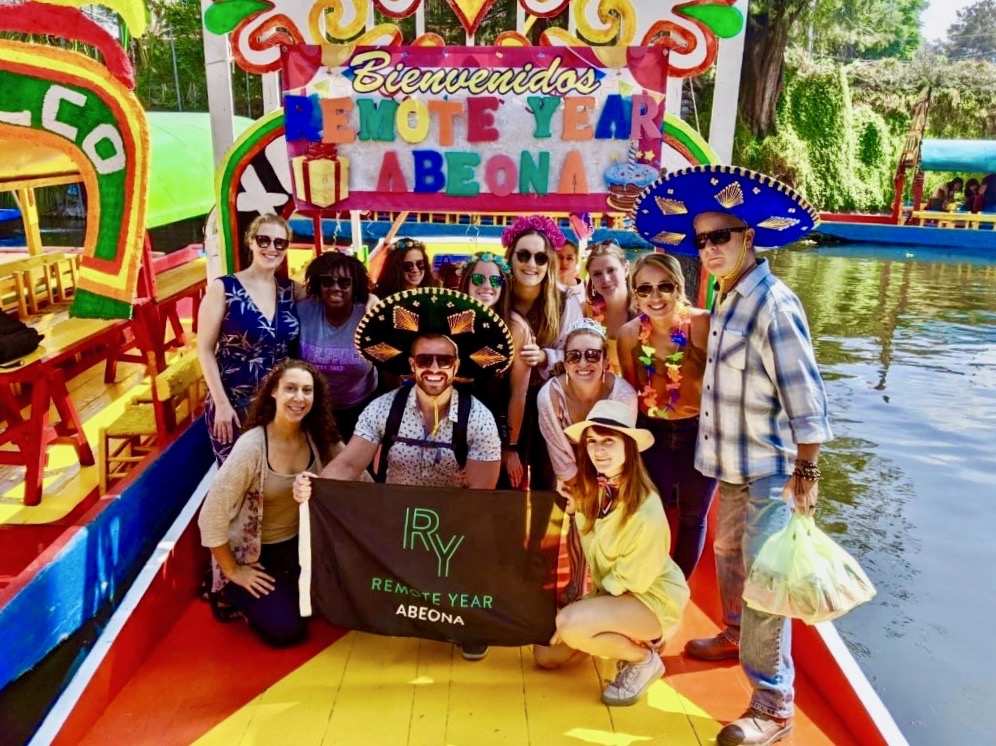
How do you meet people when you travel? Do you have any tips for people that are having challenges meeting people while traveling?
Eric: One of the significant criticisms I often hear about the digital nomad and long-term travel lifestyle is the lack of community.
I have been traveling around Latin America for the last four months with a group of 28 amazing humans. This group has been incredibly supportive, fun, and we’ve built lifelong friendships and memories together. For anyone that is more introverted or worried about finding “their tribe” while traveling, I would highly recommend the Remote Year platform.
If Remote Year that doesn’t interest you, then I would recommend the Selina brand of hostels and co-working spaces. I have been to a few, and they have a really fun vibe and good energy. Stay there, meet some people or do a tour to make some new friends! Find that courage for just a few seconds and say hi to someone new!
I also believe conferences and meetups are a great way to meet like-minded individuals!
Last but not least
What is one resource (blog, podcast, book besides your own) you recommend for those that want to pursue your lifestyle?
Eric: It’s so hard to pick one, so many books, podcasts, and blogs influenced my thoughts and helped me develop new ways of thinking about life. But, if I had to pick one, I would say mrfreeat33.com. He retired at 33 and moved to Chiang Mai, Thailand. His story is very inspiring, and I love his views on homeownership, living abroad, and life in general.
What advice do you have for others who are considering this type of lifestyle?
Eric: “He who has a why to live can bear almost any how.” – Friedrich Nietzsche
Take the leap! If you are interested in and constantly researching about this lifestyle, make a plan, and then pull the trigger. You don’t have to have everything figured out all at once. Try it out to see if it’s for you, and if you know that you have to live this lifestyle, you will 100% be able to find a way to make it happen because if your “why” is strong enough, you will figure out the how.
Tell us one belief that is held up by society as ‘common sense’ but that you disagree with and why.
Eric: Buying a house. It’s ‘common sense’ that everyone should aspire to own their own home or that buying a house is “always a great investment” and “renting is throwing money away.” I have no desire to own my own home; I enjoy the flexibility of renting and love putting the money saved towards index fund investments.
Eric: I can’t overstate the power of community! Do some research and find your tribe.
Rapid Fire Questions
| What is your favorite travel destination & why? | I love Cusco, Peru! So much history, culture, and natural beauty. I was there for five days this year and felt that I only scratched the surface of what Cusco and the surrounding area has to offer |
| What was the most creative thing you’ve ever done to save money during your travels? | I’m a big fan of travel hacking! My girlfriend and I both had American Airlines (AA) miles and flew from Dallas to Santiago, Chile, for only $5. The same thing for January 2020, I’m flying from Denver, CO to Chiang, Mai Thailand for only the cost of taxes! |
| What was your biggest travel mistake? | Packing too much! For next year in SE Asia, I plan to be carry on only and much more minimalistic. |
Thank you Eric for for taking the time to share your story with us!

If you want to know more about Eric, you can find him on the following platforms:
- Blog: nomadonfire.com
- Facebook: https://www.facebook.com/ericthenomadonFIRE
- Twitter: https://twitter.com/nomad_onFIRE
- Pinterest: https://www.pinterest.com/nomadon_FIRE
- Instagram: https://www.instagram.com/nomadonfire
The Bottom Line
Here are the main lessons we took away from this interview:
- Lesson 1 – “I felt that I was sacrificing some of the best years of my life on work that I wasn’t passionate about. […] I knew that if I didn’t do this now, I would regret it for the rest of my life” – The Regret Minimization Framework (RMF) that Eric mentioned is such a great and easy tool to use as a lifestyle philosophy. In a nutshell, the framework starts by asking you this question: “In X years, will I regret not doing this?”.I love this because it forces you to think beyond the moment which makes any fears (like the one more year syndrome) or doubts (will I be fine?) you might be having irrelevant. This is also a simple tool that you can use throughout your life for any decision that hangs above your head and you keep delaying. Without knowing what the RMF was, we use a similar process to decide to become nomadic.
- Lesson 2 – “ As a digital nomad, this is my life, not a long vacation. Developing a consistent work, exercise, and healthy eating routine while traveling to a new country every month took some practice to refine.” – Setting up a routine has been one of the challenging we’ve also been facing during our first year of nomadic living. By reading “Atomic Habits” from James Clear we found another toolkit we’ve been using to help our routine stick in an ever-changing environment, even though we move every 4-6 weeks, we lose most of our cue that was key to set these habits.
- Lesson 3 – “For anyone that is more introverted or worried about finding ‘their tribe’ while traveling, I would highly recommend the Remote Year platform.” – Community is key to live a fulfilled life and something that can be challenging as a digital nomad. For use, we used this blog, local meet-up & Facebook groups to connect with like-minded people which can be hit or miss. The Remote Year program, on the other hand, takes care of bringing these people together so you can focus on enjoying a much deeper experience. This makes sense for people like Eric that are looking for that smooth transition.
- Lesson 4 – “One of the amazing things I learned by pursuing FIRE and then transitioning to the digital nomad lifestyle […] is that it is not binary, it is a sliding scale of freedom. It’s not that you’re either FI […] or not, or a digital nomad or not, you can customize this lifestyle to fit your needs and shifting priorities over time!” – Very true! Life is a choose your adventure type of journey. You have the freedom to decide how you want to live it and what you want to put into your mix. Eric decided to slow down his FI progress to increase his overall happiness (Note: this term has lately been coined by our friend Jessica at The Fioneers as #SlowFI).
Call to action
What do you think about this story? We would love to hear from you, so feel free to share your feedback by leaving a comment below.
Sometimes we need to hear about others making unconventional decisions before we can have the confidence to make our own. If you have(or are on a path to) an unconventional journey to improve your life that has a travel component to it and are interested to share it, please reach out to us as we would love to feature your story.
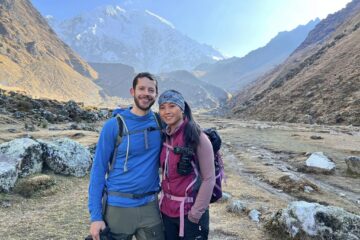
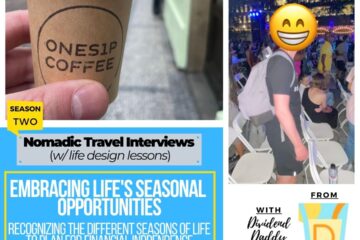
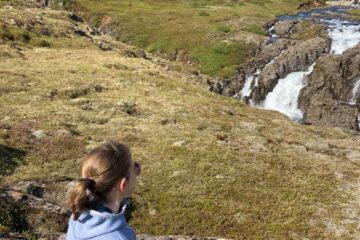
7 Comments
Bobby · January 21, 2020 at 6:10 am
Another great interview, thank you! Just a quick note, the sharing icons on the left obscures some of your copy on both iPhone and iPad.
Mr. Nomad Numbers · January 22, 2020 at 10:14 am
Hi Bobby. Glad you are enjoying these interviews! Many more to come for 2020 🙂 As for the sharing icons sidebar, I’ve disabled it on mobile & table, so hopefully this will improve your reading experience. Thanks for the feedback!
Michelle @ FrugalityandFreedom · January 21, 2020 at 6:40 am
Great interview here. This line really resonated with me: “Maintaining a healthy routine while traveling has also been more of a challenge than I thought it would be. As a digital nomad, this is my life, not a long vacation. Developing a consistent work, exercise, and healthy eating routine while traveling to a new country every month took some practice to refine.”
I don’t think I have the right balance myself yet, after a year of slow travel around USA and now spending extended time in New Zealand. Still working on this as I continue nomad(ish) life into 2020. On the upside, being in places for only a short time can involve using free week-long gym trials!
Eric · January 22, 2020 at 9:57 am
Thank you! Having a good routine is a constant challenge but usually a fun one with being able to try different gyms and healthy food options. Also, I love the free gym trials idea, enjoy New Zealand!
Sharing stories of nomads during the coronavirus pandemic (Vol. 2) - Nomad Numbers · April 1, 2020 at 1:17 pm
[…] #007 – Remote Year & SlowFI […]
What we learned from interviewing nomadic travelers - Nomad Numbers · May 16, 2020 at 7:37 am
[…] Remote Year & SlowFI […]
Financial Independence and Slow Travel with Mr. Nomad Numbers | Episode #21 - Nomad On Fire · July 25, 2021 at 3:18 pm
[…] nomadic interview series where I was interviewed along with a dozen+ nomads: […]